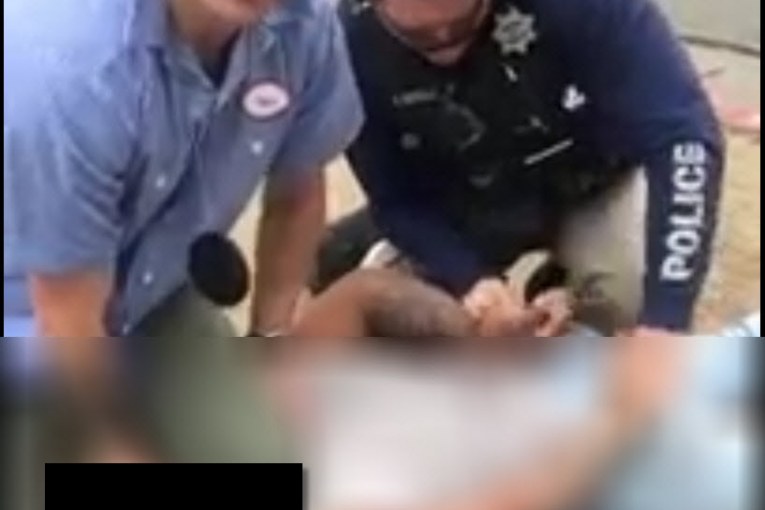

The Picnic Day incident on April 22 that has drawn so much local attention saw three men arrested, and two Davis police officers taken to the hospital after they claimed to have been swarmed and attacked. Video was released from the incident three weeks ago, and the matter remains both under criminal investigation as well as investigation into the conduct of the three plainclothes police officers who arrived in an unmarked van.
The Vanguard has learned there are three additional subjects of interest to the police. The police at this time are only willing to confirm that Romeo Lopez, 21, was arrested on Thursday night. According to Lt. Paul Doroshov of the Davis Police Department, Mr. Lopez was arrested “pursuant to an arrest warrant signed by a judge.”
Mr. Lopez, who appears to have been taken into custody and released, but not charged by the DA’s office, is accused of assault with a deadly weapon on a peace officer (Penal Code section 245(c)), resisting arrest with force (PC section 69) and attempting to free someone from police custody during a riot (PC section 405a). The latter is the charge that, until January 2016, was known as lynching but, due to confusion with the more common meaning of the term, the description was changed by the state legislature following a highly-publicized incident in Sacramento in 2015.
The Vanguard has learned that there may also be warrants for two other individuals involved in the fight, including “Angelica” who can be seen on video punching and kicking one of the officers while also potentially being assaulted herself.
However, Lt. Doroshov adamantly told the Vanguard they could only confirm the arrest of Mr. Lopez at this time.
The circumstances surrounding the arrest of Mr. Lopez remain murky at best. The Vanguard acquired a copy of the search warrant signed by Yolo County Judge David Rosenberg at 4 pm on Thursday. The warrant specifically does not request a night search.

However, Mr. Lopez told Fox40 News off camera that investigators “came to his home around 11 pm with guns drawn.” The police at that time asked to search his home, but when his mother asked to see a copy of the warrant, they claimed to have “forgotten to bring a warrant.”
At that time, the police offered to let him go if he gave officers a copy of his phone.
The Vanguard has learned from sources that Deputy DA Ryan Couzens, who is prosecuting the case, offered to let the arrest warrant go if Mr. Lopez cooperated with investigators.
Fox 40 reports said, “Lopez said he gave investigators his phone and he was released a short time later. He said he was given a copy of the warrant, which shows the judge did not authorize a night time search.”
Attorney Mark Reichel, who is representing Elijah Williams, one of the three original defendants in this case, told Fox40, “Night time searches are a little less reasonable. So a judge has to authorize a night time search.”
The original three defendants, who have yet to be charged by the DA’s office, are scheduled to appear in court on Tuesday.
In the meantime, questions about the conduct of the officers continue. The city of Davis had originally contracted former Sacramento Sheriff John McGinness to conduct the investigation.
However, after it was learned that Mr. McGinness had made remarks that African Americans were better off prior to the 1964 Civil Rights Act, the former sheriff asked to be removed from the case.
Two weeks ago, the city announced changes to their plainclothes officer policy, in light of concerns that the police did not properly identify themselves as they arrived on the scene, contributing to the confusion.
City Manager Dirk Brazil stated, “While we continue the search to find a qualified outside investigator, there are a few significant steps City staff can take in the meantime related to revising policies/procedures and increased community interaction and involvement.”
The revised policy will expand the circumstances under which police personnel “must wear various types of uniforms that make them more-readily identifiable as law enforcement officers.”
The policy further requires “vehicles used in plainclothes assignments to be equipped with a forward-facing red light that must be used when the vehicle is used in taking enforcement action.
“Interim guidelines for undercover personnel have also been issued to underscore existing plainclothes policies that restrict circumstances when undercover officers may directly take enforcement action or use force,” the policy reads. “Such circumstances are limited to situations when an officer acts to protect themselves or another person from imminent injury or harm.”
The police will also utilize the Community Advisory Board (CAB) to give input into the selection of the investigator.
Mayor Robb Davis said at the time, “By having the CAB give input into selecting the lead investigator we benefit from the wisdom of some very respected members of our community.”
He added, “The statement gives me confidence that we can learn from what happened to clarify our policies and improve practices going forward.”
—David M. Greenwald reporting


What b.s. Wanting to search his mom’s home with no warrant. Lying about the warrant? Geez. Not really surprising.
From what I can tell, they basically got a search warrant for the house but did not request to be able to search him at night. So instead, they staked him out, when he was spotted they detained him at gun point, and failed to produce the warrant but instead demanded his phone under the threat of arrest.
So the policy changes acknowledge that these civilians had no idea they were dealing with police officers until it was too late…
and yet the civilians are being arrested…
and the police officers who, at best, behaved no better than the civilians (despite the responsibility their power implies) get to go on with life with new policies…
K….
Reminds of when courts and prosecutors break laws and policies while being exceptionally punitive with civilians for doing the same.